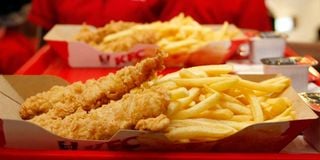Premium
Nairobi’s love affair with chicken

Fried chicken served with fries by an outlet of the fast food giant, KFC in Nairobi.
What you need to know:
- Thanks to the “Bolt Food Index Report”, we now know that Nairobians are all about chicken, chicken and more chicken.
- From Kampala, the fourth-most active place for Jumia online food, somebody grappled with the problem of chicken.
The recently released “Bolt Food Index Report 2021” told us that the most ordered food online in Nairobi last year was spicy fried chicken.
They weren’t done with the chicken. Chicken and chips were their second most ordered food, followed by fried chicken and chicken winglets. The popularity of chicken in the Kenyan capital is only increasing, said the report.
When two years ago taxi-hailing service Bolt ventured into the food delivery business in Kenya, we didn’t foresee then that they would offer this gem.
There is something about food, which makes it the perfect tool for peeking into the heartbeat of countries and their economies.
In 1986, The Economist magazine created the Big Mac Index as a playful way to measure purchasing power parity (PPP) between nations, using the price of a McDonald’s Big Mac hamburger as the benchmark. It has since become a big deal and is taken seriously.
Inspired, KFC, which got into big trouble with Kenyans a few days ago over potatoes, created the KFC Index. The index uses the price of KFC chicken buckets to estimate American dollar exchange rates for African currencies, to get a picture of whether a currency is overvalued or undervalued.
Jumia gave us, well, the Jumia Food Index. The last we heard, it said that Kenyans spent Sh2,000 on average for a meal on Jumia Food. But, perhaps more intriguing, that Nairobi is its leading city in Africa for online food delivery.
Problem of chicken
The second was Casablanca in Morocco, third the Nigerian commercial capital Lagos, fourth Uganda’s capital Kampala and fifth Côte d’Ivoire’s commercial and cultural capital, Abidjan.
Thanks to the “Bolt Food Index Report”, we now know that Nairobians are all about chicken, chicken and more chicken. And from Jumia, that Nairobi beats all of Africa in online food delivery. What they don’t tell us is why.
From Kampala, the fourth-most active place for Jumia online food, somebody grappled with the problem of chicken. He is the MD of one of Uganda’s leading poultry breeding and marketing companies.
They were doing good business but he wanted to look beyond the market surveys and understand what it is in the lives of people in Uganda that leads them to buy chicken. He drove around, looking, talking to people and taking note of any changes in the city’s environment.
After a long while, he had it figured out.
The first was easier. He figured that the extension of electricity led to an increase in chicken sales. Electricity enabled shops to buy refrigerators, in which they could stuff frozen chicken, among other things, and keep it healthy long enough to make sales.
The second was trickier. Even more important than electricity, he figured that chicken sales rose in a certain proportion to the number of new apartments being occupied. The relatively younger and professional crowd that tends to live in apartments has no time to chase a chicken and no place to slaughter it and pluck it even if they could.
Online food ordering
Chicken was also faster to cook and lent itself to being cooked in many ways: Spicy fried, plain fried, winglets...
It is, probably, that the secret to the boom in online chicken orders in Nairobi, like in Kampala, is the endless apartments mushrooming every other month around the city. It also gives us a hint into the structure of the young middle-class Nairobi family, which is likely to comprise three people — two adults and a child.
That is because chicken doesn’t lend itself to the kind of egalitarian sharing offered by beef steak. There are only two wings, which, in modern times, is the most popular part of a chicken. The adults can take one wing each and leave the child with the rest of the parts to choose from. Otherwise, once you have six grown people sitting around a table with a single chicken, there will be civil war.
The Bolt report also said that peak food delivery orders are at 2pm during weekdays and 9pm at weekends; 2 o’clock weekdays is all about the politics of lunch, particularly lunches delayed by corporate meetings that overrun and parents who failed to make it home in time to drop off or feed the young ones.
However, 3pm on weekends, that is European football. The boys and girls are gathered at a friend’s place watching, especially, the English Premier League.
And we get a glimpse into what Nairobi is, or has become, for it to be a leader in online food ordering. When you order in, it’s because you are not cooking in. Also, for various reasons, it means you’re eating less of your mother’s, aunt’s, wife’s, husband’s or staff cook’s food. You have become an uber urban creature, who is eating less from the hand of the clan or family.
It might be a window into how cosmopolitan and removed from the soil the city is, and just how far it has travelled from the village. We owe all that knowledge to spiced chicken.
Mr Onyango-Obbo is a journalist, writer and curator of the “Wall of Great Africans”. @cobbo3





